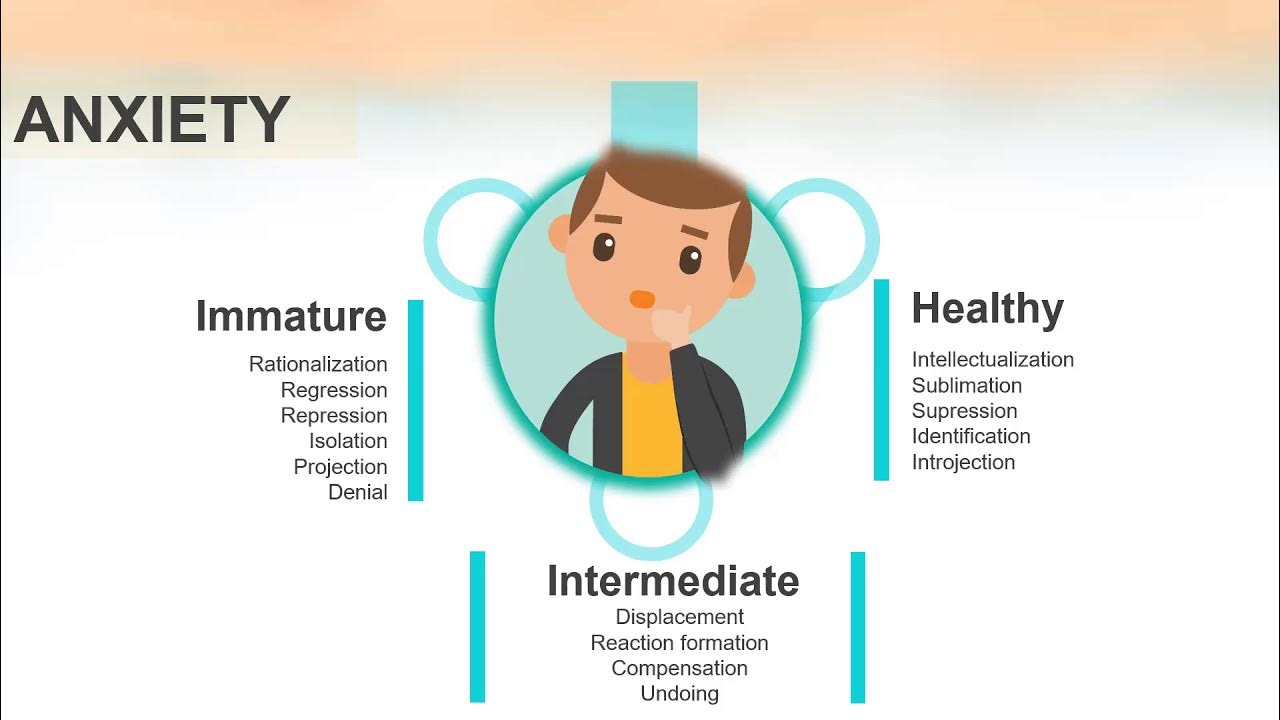Копинг и психологическая защита — Екатерина Битюцкая / ПостНаука
Summary
TLDRThis lecture explores the concept of coping, or adaptive behavior, and distinguishes it from psychological defense mechanisms. It discusses the origins of the term 'coping' in the 1960s, its role in stress theory, and how coping strategies involve cognitive and behavioral efforts to manage stress. The lecture also compares coping with psychological defense mechanisms, highlighting their different goals, processes, and outcomes.
Takeaways
- 📚 Coping strategies are cognitive and behavioral efforts to overcome stress or adapt to challenging situations, as defined by Richard Lazarus' transactional theory of stress.
- 🔄 Coping mechanisms are distinguished from psychological defense mechanisms, which often involve denial, avoidance, or repression to protect the individual from distress.
- 🧠 Psychological defense mechanisms, as explored by Sigmund Freud, can distort reality to maintain a sense of security and calm, potentially leading to long-term harm.
- 🤔 Coping involves conscious and flexible strategies that consider the individual's resources and the demands of the environment, whereas psychological defenses are often rigid and automatic.
- 🌟 Coping is goal-oriented, aiming to adapt to reality and satisfy needs, while psychological defense is primarily aimed at eliminating or preventing discomfort.
- 💡 Coping strategies are realistic, taking into account the entirety of the situation, and can involve seeking help and support from others to enhance personal resources.
- 🛡 Psychological defenses can be isolating, as they may prevent the individual from accepting help or support during times of stress.
- 🚫 Defense mechanisms are not always adaptive and can lead to a temporary improvement at the cost of long-term psychological health.
- 🛠 Coping is a learning process that can lead to the accumulation of personal experience and better preparation for future stressors.
- 🔄 Coping strategies are differentiated based on their goals, the nature of the process, their inflexibility or flexibility, their relationship to seeking help, and their long-term outcomes and functions.
- 🌱 The development of coping mechanisms is a sign of psychological maturity, reflecting an individual's ability to face challenges proactively and adaptively.
Q & A
What is the main topic of the lecture?
-The main topic of the lecture is the definition and concept of coping, or 'sovladaiushchego' behavior, and how it differs from psychological defense mechanisms.
When did the concept of coping become widely used in psychology?
-The concept of coping became widely used in psychology in the 1960s.
What is the role of coping in the context of stress according to the lecture?
-Coping is studied within the stress theory as a mechanism that allows individuals to overcome stress and maintain a balance between environmental demands and personal resources and capabilities.
Who is the prominent figure associated with stress and coping theory mentioned in the lecture?
-Richard Lazarus is the prominent figure mentioned in the lecture, who developed an authoritative theory of stress and coping in the world of psychology.
What does Richard Lazarus define stress as in the context of coping?
-Richard Lazarus defines stress as a transaction where the environment's demands exceed the individual's capacity to respond, leading to a lack of resources.
What are the two processes that mediate or act as intermediaries in coping according to Lazarus's theory?
-The two processes that mediate coping according to Lazarus's theory are cognitive appraisal and coping efforts.
How are coping strategies categorized in terms of their orientation according to the lecture?
-Coping strategies are categorized as problem-oriented, emotion-oriented, and a combination of both, where individuals manage negative emotions and act rationally and purposefully.
What is the relationship between emotions and rational thinking as discussed in the lecture?
-The lecture discusses that emotions and rational thinking are interrelated. Extreme emotions can impair cognitive functions, while moderate levels of anxiety can motivate and energize actions.
What is the difference between coping and psychological defense mechanisms as per the lecture?
-Coping mechanisms are conscious, flexible, and adaptive strategies to deal with stress, while psychological defense mechanisms are automatic, rigid, and often unconscious reactions to avoid distress.
How does psychological defense differ from coping in terms of its goals and outcomes?
-Psychological defense aims to prevent or reduce immediate discomfort, often leading to temporary relief but potentially harmful long-term effects. Coping, on the other hand, aims at adapting to reality and satisfying needs in a way that is conscious and flexible, leading to a positive accumulation of individual experience.
What is the role of help and support in the process of coping and defense mechanisms as discussed in the lecture?
-In the process of coping, individuals actively seek and accept help to strengthen their resources. In contrast, during psychological defense, individuals often cannot accept help, especially when they are overwhelmed and retreat into a protective shell.
Outlines

This section is available to paid users only. Please upgrade to access this part.
Upgrade NowMindmap

This section is available to paid users only. Please upgrade to access this part.
Upgrade NowKeywords

This section is available to paid users only. Please upgrade to access this part.
Upgrade NowHighlights

This section is available to paid users only. Please upgrade to access this part.
Upgrade NowTranscripts

This section is available to paid users only. Please upgrade to access this part.
Upgrade NowBrowse More Related Video

MENTAL HEALTH

Understanding the Self Lesson 2 Psychological View of the Self Part One (Tagalog Dubbed)

"Defense Mechanism 1" Monty Satiadarma | S2 E6

IMMUNOLOGY- Innate Immunity and Adaptive Immunity (FL-Immuno/01)

10 Main Defence Mechanisms (Freud) | 5 Minutes Summary

Coping with Stress in Middle and Late Adolescence - Personal Development for Senior High School
5.0 / 5 (0 votes)